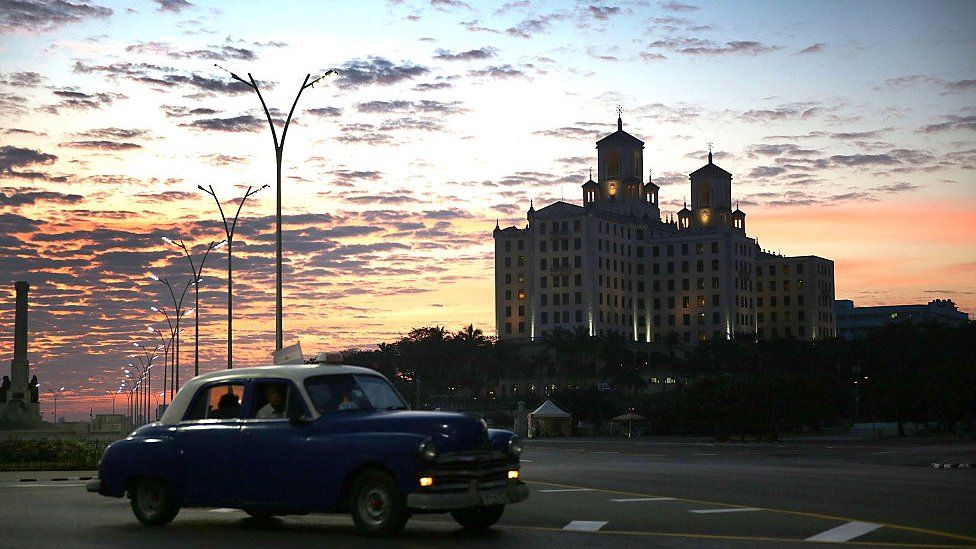US election 2016: Trump denies he breached Cuba embargo
- Published

Republican candidate Donald Trump has denied the allegation that he violated the US trade embargo with Cuba.
Newsweek reported earlier this week that Mr Trump's company secretly conducted business with the island nation, breaching decades of US policy.
Trump Hotels & Casino Resorts allegedly spent at least $68,000 (£52,300) in Cuba in 1998, violating the embargo.
Mr Trump criticised the journalist, saying: "No I never did anything in Cuba. I never did a deal in Cuba."
Democratic candidate Hillary Clinton had said on Thursday that Mr Trump appeared to have violated US laws, saying he had put "his personal and business interests ahead of the laws and values and the policies of the United States of America".
Marco Rubio, the Cuban-American senator from Florida who has endorsed Mr Trump, had also said the Trump campaign should respond the Newsweek allegation, saying he was "deeply concerned" about the accusation.
What the report says
Newsweek's front-page - citing company records, interviews with former Trump executives and court filings - alleges that Mr Trump's company, then called Trump Hotels & Casino Resorts, sent a consulting firm to Havana on its behalf in search of business opportunities.
Newsweek says Mr Trump's senior officers disguised the cash by making it appear that the trip was connected to a Catholic charity.
If the consulting firm spent US money during the visit, without permission from the US government, it would have directly violated the Cuban embargo, which remains in place to this day despite a warming in US-Cuba ties.
What the Trump campaign has said
Speaking on ABC earlier on Thursday, Ms Conway said an initial payment was made: "As I understand from the story, they paid money in 1998." Later in the same interview, she said no further deal was pursued: "Did his hotel invest in 1998 in Cuba? No."
On Thursday night, Mr Trump responded to the allegations to the NH1.com website, and criticised the Newsweek journalist, Kurt Eichenwald.
"No. I never did business in Cuba," he said before a rally in New Hampshire on Thursday. "There's this guy who has very bad reputation as a reporter. You see what his record is. He wrote something about me in Cuba. No I never did anything in Cuba. I never did a deal in Cuba. I heard about it last night for the first time."
In a 1999 column in The Miami Herald, Mr Trump wrote that he had snubbed chances to do business in Cuba. "It would place me directly at odds with the longstanding US policy of isolating Fidel Castro. I had a choice to make: huge profits or human rights. For me, it was a no-brainer."
A history of the US trade embargo with Cuba
1959: Cuban revolutionary Fidel Castro leads a guerrilla army into Havana overthrowing the Batista regime.
1960: In response to Castro's communist reforms, US breaks off diplomatic relations with Cuba and imposes a trade embargo.
1962: Castro agrees to allow the Soviet Union to deploy nuclear missiles on the island bringing the US and the USSR to the brink of nuclear war.
April 2009: President Barack Obama lifts restrictions on family travel and the sending of remittances to Cuba.
July 2015: The US and Cuba reopen embassies in each other's capitals and restore full diplomatic ties.
March 2016: President Obama makes a three-day visit to Cuba and holds talks with President Raul Castro. He expresses hope the embargo will be ended, but it can only be lifted by the US Congress which is controlled by Republicans who oppose the move.
Aug 2016: US commercial flight arrives in Cuba for the first time in more than half a century.